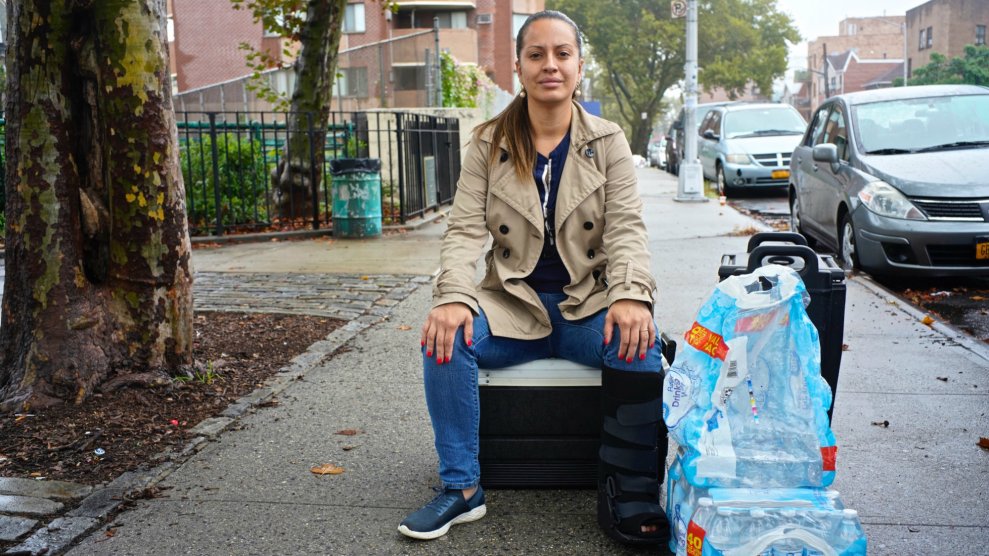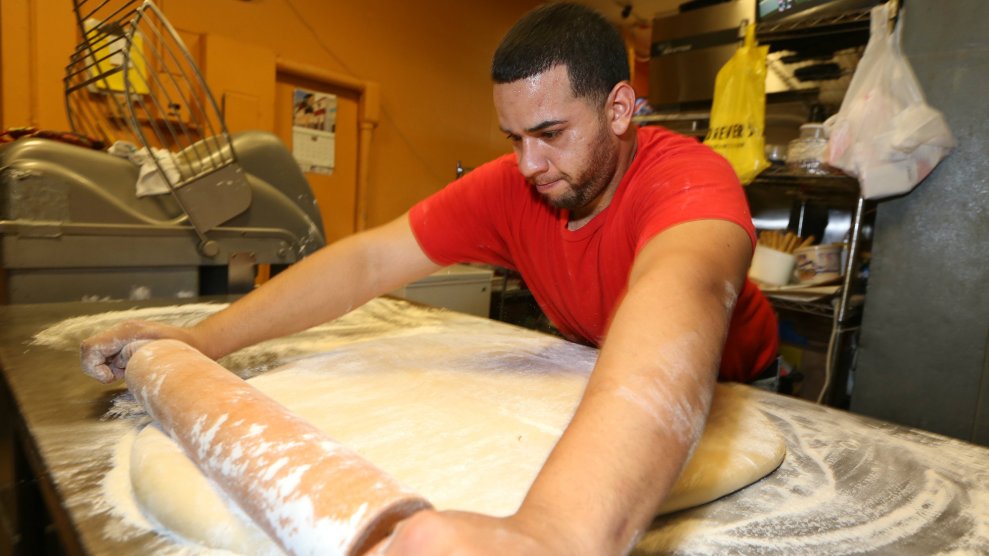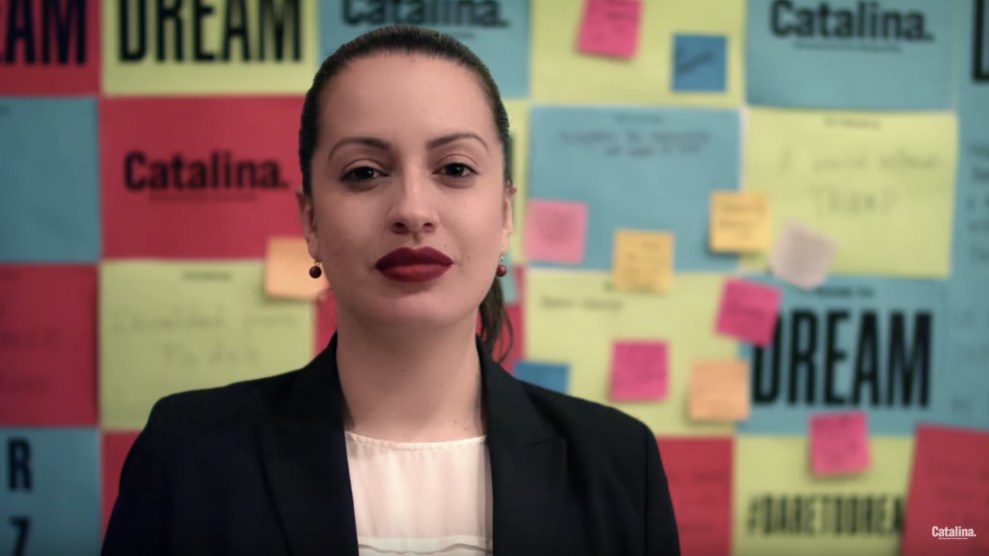
Catalina Cruz in Jackson Heights, New York. AP
One candidate fled the violence of Colombia with her mom at age nine. Another fled the Taliban at age six. A third says his parents were almost deported from the United States.
Catalina Cruz and Safiya Wazir won their primary elections in New York and New Hampshire respectively last week, while William Tong is campaigning to become Connecticut’s first Asian American attorney general. They’re representative of a surge of minority candidates in this year’s midterm elections, in which more women and people of color are not only running for office—but also winning votes and unseating entrenched politicians.
Cruz, a former housing lawyer and one of the first Dreamers to run for office in New York, says the Trump administration’s anti-immigrant stance prompted her to enter the race for State Assembly in Queens. “I have this privilege,” Cruz told Mother Jones. “I’m formerly undocumented, I’m a lawyer, I have these connections…Why am I not using it for something more than managing a state agency?”
Wazir, a former Afghan refugee running to become a state representative in Concord, New Hampshire, campaigned door to door while pregnant with her third child. The 27-year-old trounced a longtime Democratic incumbent who ran an anti-immigrant campaign and questioned how a wife and young mother could be an effective legislator.
“It gives me so much energy to be backed from the people themselves,” a jubilant Wazir told the Concord Monitor as the election results came in, showing she had won by more than a 2-1 margin. “It’s driven me to be positive.” If she wins her election in November, Wazir could become the first former refugee to serve in public office in New Hampshire.
For Tong, who won his primary to become the Democratic nominee in August, the attorney general race represents an opportunity to bring more diverse experiences into the political conversation. His parents, for instance, only ended up staying in the US after his father, a Chinese immigrant, wrote an impassioned six-page letter to Richard Nixon, who then allowed them to remain in the country.
“I wanted to give voice to people who are invisible and feel invisible like my family,” Tong told Mother Jones.
Recharge is a weekly newsletter full of stories that will energize your inner hellraiser. Sign up at the bottom of the story.
-
From bigot to friend. A South Carolina mayor posted anti-Muslim and anti-immigrant memes on Facebook—and even defended them amid backlash. Then Hardy King met members of the Muslim community in his town of Irmo and drastically changed his tune.
It started with a call from one Irmo native who was raised Muslim and wanted to politely raise his concerns. Soon, King began meeting more Muslims in his community.
Struck by their measured response, King did more than apologize: At the invitation of Chaudhry Sadiq, a local community leader, King visited a nearby mosque. He also helped Sadiq organize a town meeting on “Demystifying Islam” that drew more than 100 people.
King noted that his own fear and unfamiliarity likely framed his prior beliefs. He says Christians have a lot to learn from his new acquaintances.
“If half the Christians in this country prayed five times a day, we’d have a lot of stuff solved,” the mayor said.
Thanks to reader Zach Peterson for the tip. (Post and Courier)
-
“I’m not going anywhere.” They went surfing on their first real date. Their first kiss was during CPR.
That’s right. Andi Traynor and Max Montgomery were walking along a California beach when Montgomery had a heart attack.
Traynor, a doctor, performed CPR but thought she had lost him. Montgomery eventually regained consciousness in the ambulance and went through a triple bypass a day later.
At his bedside afterward, he told her: “Who wants to be with a guy who had a heart attack? I won’t blame you if you run for the hills.”
“I’m not going anywhere,” Traynor responded. The experience helped cement their relationship—and inspired them to start a foundation that helps teach CPR. (Washington Post)
-
Invaluable. Growing up with two deaf parents, Monica McGee developed a skill that proved vital for hundreds of thousands of North Carolina residents as Hurricane Florence plowed through.
McGee has been using American Sign Language to help provide emergency information during news conferences and other hurricane updates, appearing alongside Governor Roy Cooper and other emergency officials. A sign language interpreter for state employees, McGee wears dark clothing to contrast with her hand gestures and uses her facial expressions and entire upper body to help convey emotion.
“It’s hard on my hands and my arms and my shoulders and mentally—mentally, especially,” McGee said about her experiences signing during Hurricane Florence. Lee Williamson, who sits in the audience and feeds her information via ASL if she falls behind, said McGee is trusted for her work.
“She’s kind of been the person everyone’s expecting to see,” Williamson said. (News & Observer)
-
Noah’s Ark on wheels? Not quite. But trucker Tony Alsup did save 53 dogs and 11 cats from shelters in the path of Hurricane Florence, delivering them to a safe haven in Alabama in an old yellow school bus.
He calls the pets he saved “the leftovers”—not the adorable cuddlies that fly out of an animal shelter, but the bigger, not-so-cute ones that have a harder time finding an owner.
Florence wasn’t Alsup’s first rodeo. The trucker has hauled pets from hurricane zones in Puerto Rico and from Texas and Florida. There’s inevitably loud barking involved, but he says he doesn’t mind the noise.
“They know I’m the Alpha dog,” he said, “and I’m not here to hurt them.” (Greenville News)
Have a Recharge story of your own or an idea to make this column better? Fill out the form below or send me a note to me at recharge@motherjones.com.













